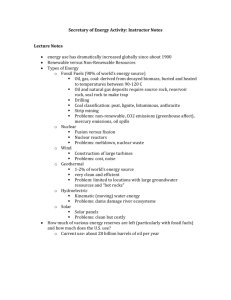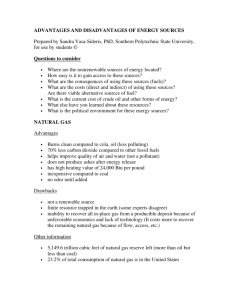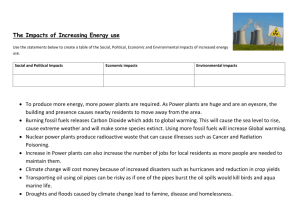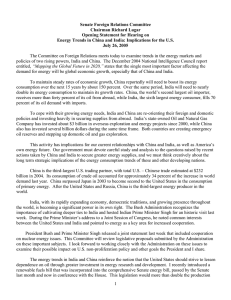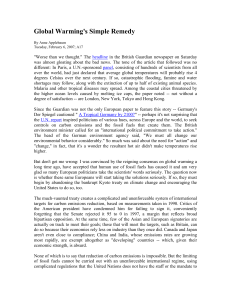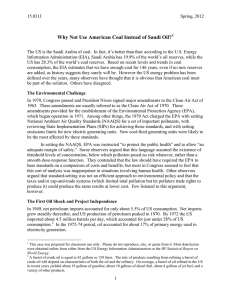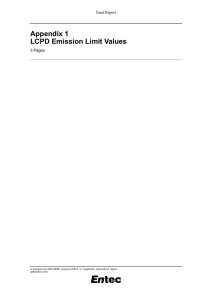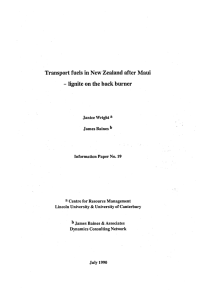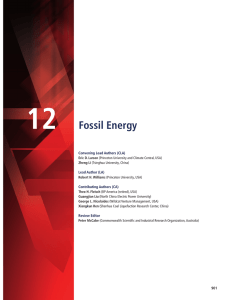U.S. Energy Problems Lecture 3 eDMP: 14.43 / 15.031 / 21A.341/ 11.161 1
advertisement
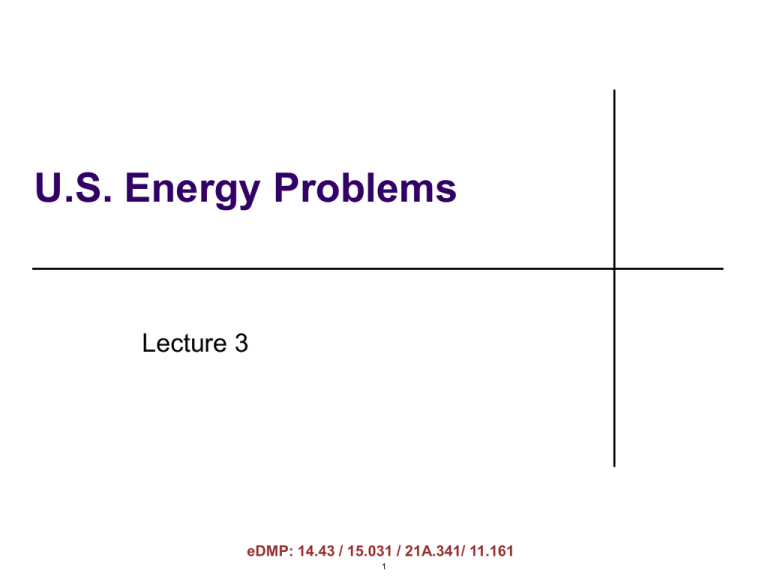
U.S. Energy Problems Lecture 3 eDMP: 14.43 / 15.031 / 21A.341/ 11.161 1 In 1970, President Nixon(!) Signs the Clean Air Act, Creating EPA • Why are we discussing this anti-pollution policy in a class on energy? • Interesting NAS estimates of 2005 “unpriced consequences” of energy use (externalities): coal-fired power plants: $62 billion (0.2¢-12¢/kwh) gas-fired power plants: $749 million (0.05¢-1.0¢/kwh) GHG emissions: coal roughly 2x gas/kwh transportation: $56 billion ($36 billion light-duty, $20 billion other) electric vehicles (coal) worse than diesel worse than gasoline or corn ethanol • Is it sensible to estimate, ethical to use such $ values of (statistical) lives, sickness? 2 Was the 1970 Clean Air Act Necessary? Sensible? • Why not just give property rights? Example in Viscusi et al: mill does $500 damages, could stop for $100, town could undo for $300. Mill stops if either has property rights • Why can’t assignment of property rights work in general? Why involve government? • Why not leave it to the states to decide whether/how to regulate? • Should EPA have been told to set the NAAQS using benefit/cost analysis ($/life)? 3 Why not just charge for damages? Viscusi et al: in theory can use a (Pigouvian) tax to get optimal pollution at lowest cost… Any reasons why it might nonetheless sometimes be sensible to set standards instead? 6RXUFH9LVFXVL:.LS-RVHSK(+DUULQJWRQ-UDQG-RKQ09HUQRQ (FRQRPLFVRI5HJXODWLRQDQG$QWLWUXVWWKHG0,73UHVV,6%1 Now it is November, 1974 • What has recently happened to put energy policy on the Washington agenda? • President Nixon is considering announcing “Project Independence,” an effort to make the US self-sufficient in energy by 1980 • How important is energy independence, and why? Does it guarantee “energy security? • How much should the nation be willing to pay for it – in dollars per gallon of gasoline, say? • Would you advise Nixon to announce “Project Independence”? Why or why not? 5 It is 1975, Gerald Ford is the PostWatergate President • What has happened to oil prices lately? • President Ford is considering supporting either a motor fuels tax or regulation of average new car and light truck mileage – the CAFE program • Would you have advised him to support the tax, the CAFE program, or neither – and why? • How else might the US have reduced its use of petroleum? 6 It is late 1980, and President Carter is packing his bags • What has happened to oil prices since 1975? • Some of Carter’s advisors are advocating building a synthetic fuels industry that could turn enough US coal into motor fuel to eliminate the need to import oil. • What would you like to know to decide whether such an effort would be in the public interest? • Based on what you do know (and what Carter might have known in 1980), would you advise him to support this effort and establish the Synthetic Fuels Corporation? 7 It is 1986; Ronald Reagan is President • What has happened to oil prices since 1980? • How well has the Synthetic Fuels Corporation (SFC) performed? • Would you advise President Reagan to abolish the SFC? Why or why not? • What facts would you like to have had in order to be confident in your advice? • Suppose the SFC had built enough capacity to be able to eliminate the need for oil imports, but at twice the cost of conventional motor fuels. What would you have advised then? 8 It is February 2012, and Barack Obama is President • What has happened to US dependence on imported oil since 1986? Overall? Recently? • What happened to CAFE standards from the mid-1980s until the late 2000s? Can you explain this pattern? • Case doesn’t mention 2007 law calling for major increases, proposed in 2008, finalized in 2009 • What new environmental concern, not on the radar in the mid-1980s, is complicating energy policy decisions? 9 A Few (Preliminary) Words about Climate • Even though essentially all nations have signed the 1992 UN Framework Convention on Climate Change, which calls for stabilizing GHG concentrations “at a level that would prevent dangerous anthropogenic interference with the climate system”, little has been done to solve this hard problem: • Stabilizing concentrations would require serious actions by many nations, rich & poor, with very different energy systems, and there is no world government to make or enforce rules • This problem involves future generations, since emissions of the main anthropogenic GHG, CO2 (mainly from fossil fuels & land use change), have a half-life around a century; it is politically tough to get people to bear costs today for uncertain benefits in a century or more • Because CO2 is removed from the atmosphere slowly and current emission levels are raising its concentration, global emissions must be CUT drastically to stabilize its concentration 10 The last point is critical & hard to grasp intuitively (Will explore later with a simple computer model.) 11 Suppose net removals are roughly constant. Visualize or sketch a path of future anthropogenic emissions consistent with the preceding scenario: a gradual near-term rise, then stabilization by 2100. 12 13 Even smart people miss this 14 Down a risky path • Since 1992, there have been 17 conferences of the parties to the UNFCC (COPs), most recently in Durban, South Africa • COP 3 in 1997 produced the Kyoto Protocol, calling for rich countries (only!) to make reductions in 2008-12 • The EU & others ratified; the US did not, and President George W. Bush formally rejected the Protocol in 2001 • Subsequent COPs have failed to produce a global agreement on emissions, and the US has been not likely to pass emissions-limiting legislation any time soon • Your COP, beginning 2/29, may be the last chance, since there is growing evidence that damages from climate change may be severe & contain nasty surprises… 15 Back to 2012 & President Obama • Would you advise the President to favor or disfavor electricity generation from coal? What are the issues? • What about production of synthetic motor fuels from coal? What are the issues? • What about subsides for EVs and PHEVs? What are the issues? • Are there any other policies you would advocate to solve “the energy problem”? • Is US coal part of the solution to the US energy problem – or part of the problem? 16 MIT OpenCourseWare http://ocw.mit.edu 15.031J / 14.43J / 21A.341J / 11.161J Energy Decisions, Markets, and Policies Spring 2012 For information about citing these materials or our Terms of Use, visit: http://ocw.mit.edu/terms.
